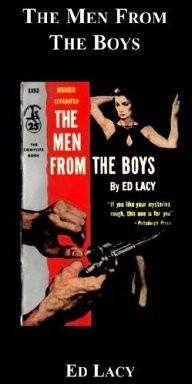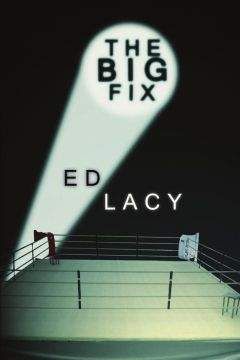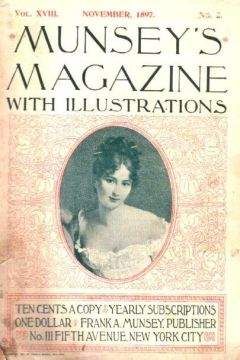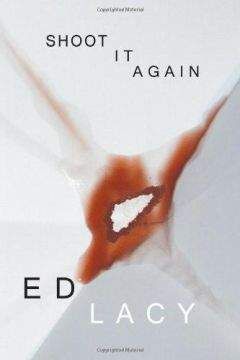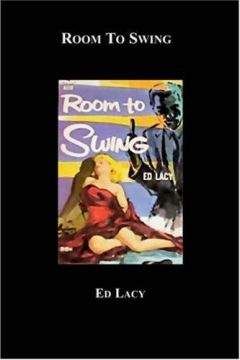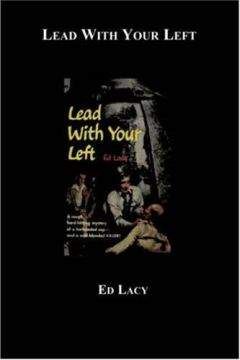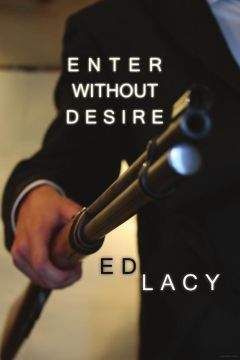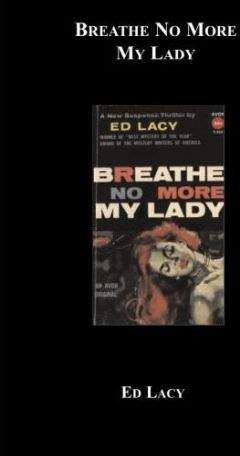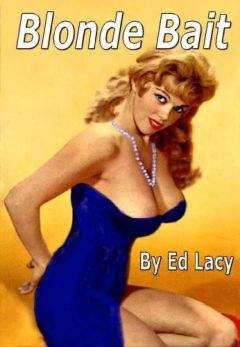Ed Lacy - South Pacific Affair
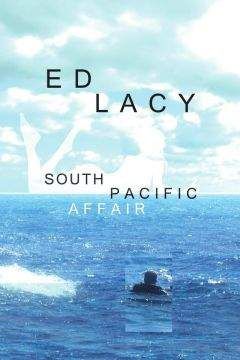
Скачивание начинается... Если скачивание не началось автоматически, пожалуйста нажмите на эту ссылку.
Жалоба
Напишите нам, и мы в срочном порядке примем меры.
Описание книги "South Pacific Affair"
Описание и краткое содержание "South Pacific Affair" читать бесплатно онлайн.
She looked me over, or rather we both looked each other over, then she nodded slowly and said, “Yes, you must be Mr.—” For a split second a blank, frightened look ran across her face, then she smiled quickly, showing good teeth and said, “Yes, you're Ray.” Her voice was calm and firm. “I'm Ray Jundson, Mrs. Adams.”
“Of course. Please come in. And excuse my memory—it plays tricks with me at times.”
The rest of her clothes were scattered over the one chair and on the ancient dresser were a number of sealed battles with specimens of plants and sea life. For a moment neither of us spoke and she still stared at me openly. I pretended to study the bottles and she said, “I am a student of botany. I take it you are willing to sail me to Numaga?”
“Yes, Mrs. Adams. Although you've overpaid for—”
She waved a thin hand. “Money has little meaning for me. And I want to have a chance to know you.”
“Why?”
She smiled. “I always like to know another human being, especially one my daughter likes.”
I didn't know what to say. I knew how gossip gets around but I was amazed it could jump several hundred miles of ocean in less than a month.
“Also, I am anxious to go home. When can you sail?”
“Whenever you wish, Mrs. Adams.”
“Let's make an end of this banal name nonsense, Ray. My name is Nancy.”
“New Englander?”
“Well, yes, although I've spent most of my life in these islands. I came here with Tom—Dr. Adams—in 1912. Where is your boat headed for?”
“Any island where we can find business. I must warn you our cabin is full of roaches and—”
“Come, Ray, I've traveled on island boats before. I'd like to make a few stops on the way, and perhaps you can do some trading. I've just spent several months in the Gilbert Islands—for my malaria.”
“The Gilberts are malaria islands?”
She nodded, scratched her thin breasts through the slip. “I went to get a good dose of malaria. You see, I contracted a disease long ago, without knowing it. And they claim malaria prevents paresis, although in my case the cure may be a bit late. Well, I have seen all my Papeete friends. I shall be ready to sail in the morning. Is that convenient for you?”
She said this in a quiet, soft voice. I stuttered as I told her, “S-sure, guess the morning will be f-fine. I have to check with my p-partner.”
I never had a sweet old lady casually tell me she was suffering from advanced stages—or any stages—of syphilis before.
Chapter III
We didn't sail the next morning. When I returned to the Hooker and told Eddie, he was all for it, and promptly took four hundred francs to buy some “shirts and things.” He came back two afternoons later, without any “shirts and things”; he merely said he had been sleeping off a drunk “someplace” and promptly went to sleep.
Mrs. Adams was a true islander, for when I told her we weren't sailing, that I couldn't locate Eddie, she accepted it as a normal thing, said it was all for the good because there was an old French movie she wanted to see.
But two days later she was at the quay bright and early with her woven pandanus bags, her jars, and several elderly Tahitian women who kissed her goodbye and gave her roasted chickens. Eddie and I—mostly I—had sprayed and cleaned the cabin, arranged to sleep on deck. When we stopped at Motuiti isle for the customs men to give the boat a going over for rum—there was a twenty-five buck fine for every litre found hidden away—Eddie suggested we eat one of the chickens. Nancy agreed and the three of us sat down and went through two fine-tasting roasted chickens.
The old lady turned out to be a good sailor and, of course, fell in love with our cutter. She took the wheel, did the cooking, spoke Tahitian, French, and even Chinese, and got along first-rate with Eddie. Like all Polynesians, even though he came from far away Hawaii, he had relatives in every island and atoll, and it seemed Mrs. Adams knew them all, in fact there wasn't an isle in the Pacific she hadn't visited. So she and Eddie sat gabbing about so and so ”... on Rarotonga. Ah, he is a fine man and all of his wives have always been good women.” And Eddie would add, “His second wife, Tar a, was a cousin of my mama's aunt.” Of course, I felt like a stranger.
On the first morning out when it was Eddie's watch he took the wheel from Nancy, glanced at the sun for a moment, told her “You're way off the course, Nancy. You're going south by southeast instead of by southwest.”
“I changed the course,” she said simply. “I thought we might stop at PellaPella. That's a small island near the Cook group. Ever been there?”
“Nope, but I heard of it. Isn't that the island of the great house?”
“It is and the house belongs to a very dear friend of mine, Edmond Stewart.”
I was a trifle annoyed at the high-handed way she had changed the course, then doubly angry at myself for being annoyed. She was paying for the cruise and what difference did it make to me where we went? I got into the conversation with, “Isn't he the writer, did all those books about the waving palms and eager, waving bosoms?”
The old lady laughed. “Indeed, Edmond has written some of the world's most trite novels and made a fortune. But don't let his books fool you. He's an intelligent man. This will only take us a few hundred miles off our course and no doubt you will be able to trade.”
“Sure,” I said, “we go any place the wind takes us.”
Later, wanting to know everything about Ruita's background, I asked casually: “When did you first come to the South Seas, Nancy?”
“Back in 1912. As Seventh Day Missionaries in the Marquesas. We were frauds. Tom started out studying for the cloth but gave it up for botany. He didn't want to teach and longed to come here. The only way we could swing it was as missionaries. We had three very fine years, then a year on PellaPella, followed by more wonderful years in the Tuamotus. Tom died there, in the flu epidemic which swept the islands.”
Eddie said he was sorry to hear that, the proper note of sorrow in his voice. I asked, “Did you meet Ruita's father in the atolls?”
“No, that was on Numaga. I really don't know much about Louise's father. Barely remember him at all.” Mrs. Adams said this in a very matter-of-fact voice, and I shut up.
Eddie was in one of his talkative moods. After he finished with his war experiences, he started on the ring—talked for two days. The old lady listened as if she were interested; maybe she was.
Mrs. Adams did lots of fishing, with an expensive glass rod and reel. Each fish became a short biology lecture, complete with the Latin name, feeding and breeding habits. Between fish talks and fight talk, I tried to steer the conversation around to Ruita but always came up against a blank wall. When I told her, “Ruita has many of your features,” Mrs. Adams looked puzzled and asked, “You really think so?”
We sighted the PellaPella late in the afternoon but stayed outside all night, tacking back and forth. In the morning I got the engine going while Eddie sat on the bowsprit, called back steering directions which weren't necessary as the channel was plenty wide and deep. The first thing we saw as we slid into the smooth water of the harbor was the Shanghai anchored there.
We dropped our iron on the other side of the small harbor, opposite the schooner. The bottom was sandy and Eddie growled that we would have to keep an anchor watch.
The forward deck of the Shanghai was full of sailing canoes, all of them lashed together. I saw Buck and Teng watching us through glasses. There seemed to be a lot of men gathered on the beach and when several canoes came out to greet us, Eddie and Mrs. Adams chattered with them in dialect, asked about Mr. Stewart. They told us the men on the beach were playing soccer, a last game, as most of them had signed on the Shanghai as divers. When Eddie asked about copra they said there was some we could pick up. Evidently Buck wasn't interested in a few tons of copra; probably expected to be away from Papeete so long the stuff would spoil.
Mrs. Adams was in a hurry to see her Edmond so we all piled into the dinghy and rowed ashore. The soccer players surrounded us to say hello and of course they were kicking the ball around with their bare feet. Eddie, the show-off, immediately flexed his heavy muscles, then picked up the ball and punched it, sending it high in the air.
When Nancy impatiently told him to come on, Eddie said he'd rather hang around the beach; it was best to keep an eye on the boat anyway in case the anchor slipped.
Nancy and I walked through the short village main street lined with well constructed huts, each with paths and flowerbeds bordered with empty beer bottles. Most of the islanders had bicycles and in front of one hut there was a 1947 Buick without tires, in various stages of rust. A young man told us rather proudly it was his.
It was about a half a mile of sharp uphill, zigzag walking to reach Stewart's house and while it was a kick to be climbing a hill after all the months of living on a deck, we had to rest several times. I was puffing harder than the old lady.
An old man came along carrying a pole with a hook on one end, pulled down a nut for us to drink. He had a wrist-watch on his left arm and a gold flexible watchband on the other. As we started up the mountain path again I asked Nancy where the people got all the beer, the car, the many bicycles, broken and running, and the wristwatches.
“When they dive they make good wages, sometimes as high as two hundred dollars a day for a very, very good day. Of course they are swindled out of the money. I'm sure that schooner in the harbor is loaded with cycles, fancy jewelry, and other trash, all of which will be sold at fantastic prices. Have you ever visited an atoll during the diving season, Ray?”
I shook my head.
“It's quite a sight. A carnival of cheating. The divers return —or are towed for fancy fees—with their canoes full 6f mussels and right at the edge of the beach are merchants hawking all kinds of junk—from ballpoint pens to bicycles and tins of food—along with gambling, prostitutes, rum, candies, shoes and clothing. The divers seldom return with any money but they all consider they have had a grand time.”
“It's a shame to exploit them that way.”
Nancy winked at me. “Whether we return with money or not makes little difference in our lives for money is not a necessity here, only a trinket.”
“Sometimes Eddie and I miss those 'trinkets,' but it doesn't worry us too much.”
“Money can be a burden. I am the last of my family—in the States—and from various inheritances, some from people I've never seen, I have almost a half-million dollars back in Boston. That will be Louise's some day, but lawyers constantly write me and are puzzled as to why I never invest.”
I stopped walking. “You have a half a million bucks?”
She looked at me sharply. “Why? Does that make any difference? If it was waiting for you in the States, would you give up all this peace, rush to get it?”
“Well ... I don't know.”
She suddenly laughed and reached up and ran her hand through my wild red hair, knocking my cap off. “I like you, Ray, you're honest—I think. Now, let's stop talking about a silly thing like money and start walking. Another turn and we'll be on the other side of this stupid hill, in view of the house.”
When I had my first up-close view of Stewart's house it was breath-taking. The house was made of hard pine wood, all bleached grey-white by the sun, and built like a Swiss chalet. It had three stories and how it clung to the sharp slope of the mountain was a puzzle. From the rear porch one could spit several hundred feet straight down.
“A monstrosity of conceit, isn't it?” Nancy said.
“It must have cost a fortune.”
“Indeed it did. Edmond sold two of his silly books to the motion pictures for a fantastic price back in—can't recall when. Sometime in the twenties. He spent it all on this—much like the islander who has the car below. Unfortunately he has been forced to live in one room for the last several years—he's bedridden. I am anxious for you to meet him, like him.”
We walked through a large and well-cultivated garden with pear and peach trees, along with mangoes and other tropical fruits, and reached the entrance of the house which was on the middle floor. A fat islander in clean white drill shorts came out to greet us, followed by several young girls dressed in pareu cloths. They greeted Nancy with great delight, hugging and kissing her and I could make out enough of their dialect to hear the man say, “We are pleased you return to us so soon, Mama. What is new in Papeete? Did you bring the cigarette holder I want?”
The “Mama” was merely a form of greeting, but the old lady had said she hadn't been here in years and now I wondered why she lied to me. She got a bit flustered and stopped their talk by taking out small gifts from her handbag.
I was standing in the doorway, lost in all this chatter. One of the girls asked if I wanted some cold beer. Before I could answer yes, a deep, bull-like voice roared through the house with mild thunder.
“Nancy Adams! Lord God, what are you waiting out here for? Come to me at once. And bring the young man for me to examine!”
The girls giggled and Nancy sighed. She took me into another room while I wondered how this Stewart knew I was coming.
The room was tremendous, the entire width and depth of the house, with great sliding windows giving a complete view of the harbor and the ocean. In a large bed near the windows a thin little man was propped up on two pillows. He had a crazy white beard starting below his eyes and going half way down his chest, where it was neatly tied with two red ribbons. His long face seemed all hair, but the eyes were sharp and alert, and what little skin could be seen was transparent and wax-like. The beard around his mouth was stained a dirty tobacco brown.
Подписывайтесь на наши страницы в социальных сетях.
Будьте в курсе последних книжных новинок, комментируйте, обсуждайте. Мы ждём Вас!
Похожие книги на "South Pacific Affair"
Книги похожие на "South Pacific Affair" читать онлайн или скачать бесплатно полные версии.
Мы рекомендуем Вам зарегистрироваться либо войти на сайт под своим именем.
Отзывы о "Ed Lacy - South Pacific Affair"
Отзывы читателей о книге "South Pacific Affair", комментарии и мнения людей о произведении.







